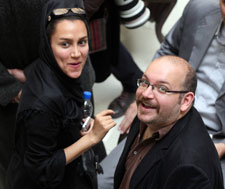Last week, Mohammad Javad Larijani, a top adviser to the country’s supreme leader, said in an interview with Euronews television that the case of Jason Rezaian, The Washington Post correspondent who has been imprisoned in Iran since July, might be resolved in “less than a month.”
Time is of the essence. Rezaian’s brother, Ali, told me in an interview in New York on Friday that his brother has been kept in solitary confinement throughout his 110 days of detention, which has taken a toll on his mental and physical health.
The time frame given by Larijani corresponds with a November 24 deadline to conclude negotiations with the U.S. and other powers over Iran’s nuclear program–bolstering arguments that Rezaian is a pawn in the power struggle between the country’s hardliners and the more moderate President Hassan Rouhani.
Ali Rezaian said it is unfair that Jason’s health and well-being should hinge on events over which he has no control. “No one is going to make a decision about these larger policy issues because Jason has been in jail for such a long time…it doesn’t help anyone’s cause to have him part of it.”
But the speculation around the reason for Jason’s detention is the outcome of a cruel guessing game, because no formal charges or accusations have been made public. This is why CPJ Executive Director Joel Simon, at a U.N. Correspondents Association event in September, referred to Rezaian’s arrest as a case of “judicial kidnapping.”
When Larijani was pressed on the reason for Rezaian’s detention, he said only the “dossier” was not ready. Ali Rezaian told me that he understands Iran has its own legal and investigative process, but since there has been no evidence or official accusations disclosed, there is hope that the case will be dropped. “It would be the right thing to do,” he said.
That is what happened with the case of Jason’s wife, Yeganeh Salehi, a correspondent for the Abu Dhabi-based newspaper The National, who was arrested with him and released 60 days later.
In the meantime, Rezaian’s family is extremely concerned about his health. The journalist suffers from high blood pressure and Ali Rezaian is worried about depression as well as new problems with Jason’s eyes and other body pains. “Those are temporary pains, but could compromise his life and health in the long term if he is kept in custody much longer,” Ali Rezaian told me.
Jason’s mother has pleaded for his release. “I wake up every morning awaiting a phone call, an email, or even a knock at the door with news that Jason has been released, but there has been no news.” She added, “I speak directly to those with the power to release my son, Jason Rezaian–enough is enough.”
The sentiment is shared by journalists and colleagues who worked with Rezaian’s family to establish a website, freejasonandyegi.com, demanding his release. Please visit the website, help spread the word about his arrest, and on social media ask the Iranian government to #FreeJason.
